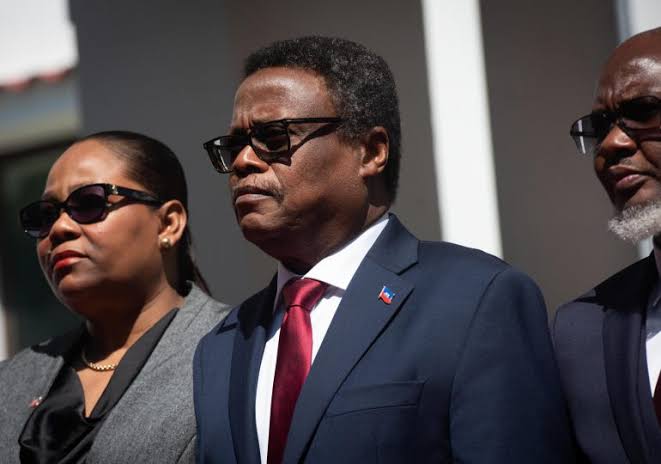
Haiti and Venezuela diplomats shake hands following the official restoration of diplomatic ties.Pic: Dominican Today
Renewed Cooperation Marks a Shift in Caribbean Foreign Policy Strategy
Haiti and Venezuela diplomatic ties have officially been restored after years of strained relations, signaling a shift in both nations’ approaches to foreign relations and regional cooperation.
The decision was confirmed following a bilateral meeting in Port-au-Prince, attended by senior diplomats from both countries and witnessed by representatives of the Caribbean Community (CARICOM).
The resumption of ties comes after a period of more than five years during which diplomatic relations had been frozen, largely due to political shifts in both nations and Haiti’s alignment with Western powers opposing Nicolás Maduro’s administration.
Analysts describe the move as a pragmatic step for both governments seeking to stabilize their international standing.
Why Haiti and Venezuela Are Reconnecting Now
Haiti Venezuela relations were historically rooted in mutual support during periods of political and economic hardship.
However, disagreements over Venezuela’s internal politics and Haiti’s participation in the Lima Group created a rift that lasted through multiple administrations.
Now, with Haiti grappling with political instability and a humanitarian crisis, re-engaging with Venezuela offers potential relief through energy cooperation, humanitarian assistance, and diplomatic solidarity.
“Restoring ties with Venezuela opens avenues for Haiti to access regional support frameworks and potentially benefit from energy cooperation similar to PetroCaribe,” said Dr. Claude Henry, a foreign policy analyst in Port-au-Prince.
For Venezuela, rekindling ties with Caribbean nations remains part of a broader strategy to overcome diplomatic isolation. By normalizing relations with Haiti, Caracas signals its readiness to reassert influence within CARICOM and the broader Americas.
Energy and Humanitarian Assistance on the Agenda
Officials indicated that early discussions would prioritize energy supplies, given Haiti’s ongoing fuel shortages and Venezuela’s interest in reviving regional energy agreements.
Talks may also include technical cooperation in agriculture, healthcare, and infrastructure development—sectors where Venezuela has offered assistance in the past through initiatives like the PetroCaribe program.
“This is not about ideology; it’s about necessity. Haiti needs reliable partners, and Venezuela needs to rebuild its diplomatic presence in the Caribbean,” said Jean Marc Denis, a political advisor to Haiti’s Ministry of Foreign Affairs.
Regional Implications for Caribbean Diplomacy
Haiti Venezuela diplomatic normalization is likely to impact broader Caribbean diplomacy. Haiti is a founding member of CARICOM, and its renewed ties with Venezuela could influence discussions within the bloc about engaging with nations under Western sanctions.
“The Caribbean has always balanced relations between global powers. Haiti Venezuela relations being restored could embolden others to reconsider how they engage with Caracas,” said Professor Maria Baptiste, an expert on Caribbean politics at the University of the West Indies.
Some Caribbean nations, including Saint Vincent and the Grenadines, have maintained strong ties with Venezuela throughout its diplomatic challenges. Others have distanced themselves. Haiti’s shift could tilt that balance, potentially strengthening Caracas’s influence within regional bodies.
Challenges Ahead for Sustainable Engagement
Despite the announcement, experts caution that rebuilding trust between Haiti and Venezuela will take time.
Both nations face significant internal crises—Haiti with governance and security, Venezuela with economic recovery and sanctions—that could complicate the speed and scope of cooperation.
Furthermore, external pressure from major powers like the United States, which maintains sanctions against Venezuela, could influence how deeply Haiti can engage without risking diplomatic fallout with key Western partners.
“Haiti is walking a fine line. It seeks immediate benefits but must navigate complex geopolitical currents,” Professor Baptiste added.
What This Means for Haiti’s Foreign Policy Strategy
Haiti Venezuela ties fit into a broader recalibration of Haiti’s foreign policy under its transitional leadership. Faced with escalating security concerns and humanitarian needs, Port-au-Prince is exploring partnerships beyond traditional Western allies.
Restoring ties with Venezuela aligns with efforts to diversify diplomatic engagements and revive access to resources amid declining international aid.
Haitian officials stress that this is part of a pragmatic strategy, not a rejection of existing alliances. “We are not replacing partners; we are expanding options in the national interest,” Denis explained.
Early reports suggest upcoming discussions may include broader Caribbean development initiatives and possibly debt restructuring linked to past Venezuelan support programs.
Looking Ahead: Rebuilding Relations with Caution
Haiti Venezuela relations are entering a new phase, marked by cautious optimism. Both nations appear motivated by practical concerns—energy security, economic cooperation, and regional stability—rather than ideological alignment alone.
The success of renewed relations will depend on how effectively both governments can deliver on promised initiatives and whether external geopolitical pressures allow these efforts to take root.
The broader Caribbean will be watching closely to see if Haiti’s diplomatic shift brings tangible benefits or new challenges to an already fragile nation.
Also Read: Saint Lucia Canada Agreement Ends Amid Reforms
Observers anticipate further announcements at upcoming CARICOM summits or during bilateral exchanges later this year. For now, Haiti Venezuela ties symbolize a small but significant step in reshaping Caribbean diplomatic dynamics.

